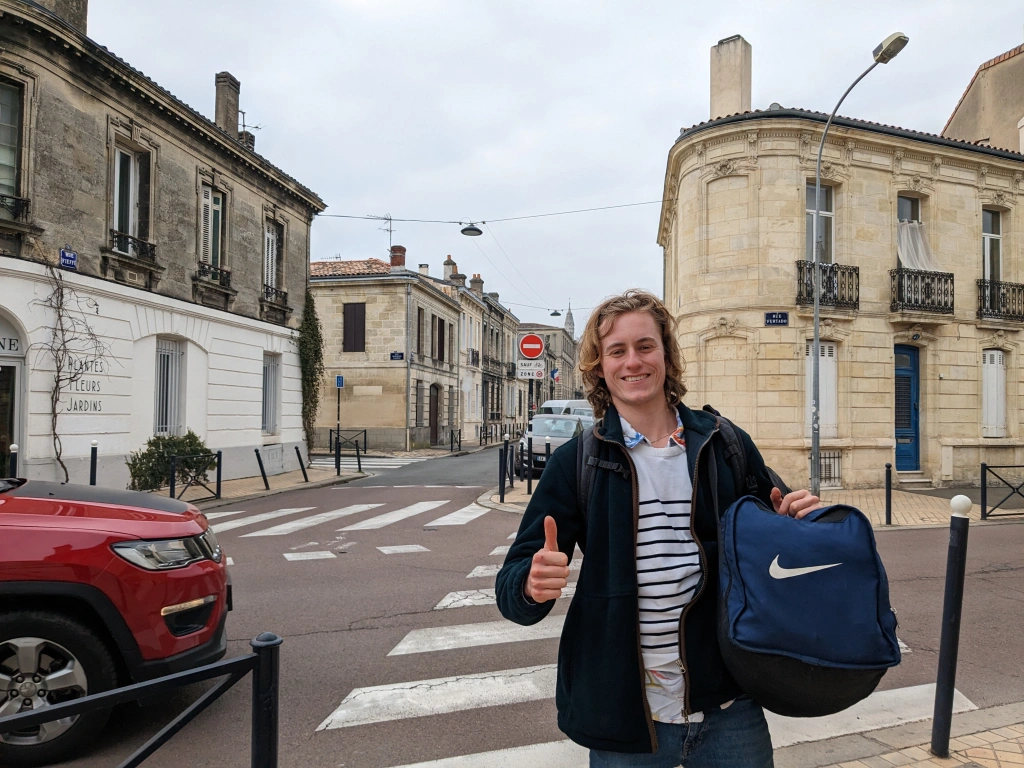The Trip - Bordeaux and Change
I am in the Claret capital with my dear friend Nick, we are staying in a hotel I have once stayed in before. The art on the walls is familiar and yet the city seems shot with beauty and warmth unlike the memories I have of it from two and a half years back - it was raining then I feel. We had a nice wander and nice conversations, the city architecture is beautiful and consistent. Little shrubbery grows out from the cracks of dusty white, sandstone coloured houses with intricate brickwork patterns.

Nick and I both enjoy literature and writing and have known each other since the age of 11 - sharing the formative years of school and university. We often look back and discuss the things which we have experienced in our shared environments, how things have changed and how we have grown as men: relationships, values, friendships, memories.
We saw a map in a museum showing how the Bordeaux has expanded since the Roman times around the Garonne. Perhaps we also grow in the same way, pushing out from a small base of personality traits to building a greater, more complex person, our centre changing to the North, the south, new developments being made.
It feels as if we are both connected deeply to the times of our teenage years, especially our school time. I once wrote in a little piece called “The Barbeque” where I wrote that the people I was at school with are like a family to some extent. I may not be close to many of them, but in mutual reflection of our shared school moments, the way our lives were similarly anchored to a flag, a way of life, there is great love between us. In the trenches of teenage school years, great and silent bonds are formed.
As I have read more recently, perhaps my thoughts have changed in some way. I recently finished Les Années by Annie Ernaux and I was particularly struck by a thought of hers regarding her past selves. She notes that when she looks back at old photos of herself - in Rome, as an aupair in England - she sees these past-selves as distinct from her, that the person she was in each photo continues living in that city, in that part of time. I see this perhaps as looking back and tracking the possible paths one could have taken.
It is said that change is the only constant in our lives and Nick and I both were enjoying reminiscing on how things are different to what they once were. Nevertheless, I feel like we both know ourselves better, know who we are, have a sense of an identity - and this has been in no small part thanks to painful change. I think back to the moment in Tennyson’s Morte d’Arthur where Arthur is being laid in a barge and taken to the after life. Sir Bedivere cries out…
“Ah! my Lord Arthur, whither shall I go?
Where shall I hide my forehead and my eyes?
For now I see the true old times are dead,
When every morning brought a noble chance,
And every chance brought out a noble knight.
Such times have been not since the light that led
The holy Elders with the gift of myrrh.
But now the whole ROUND TABLE is dissolved
Which was an image of the mighty world;
And I, the last, go forth companionless,
And the days darken round me, and the years,
Among new men, strange faces, other minds.
To which Arthur replies…
“The old order changeth, yielding place to new,
And God fulfils Himself in many ways,
Lest one good custom should corrupt the world.
Comfort thyself:”
Arthur tries to dispel the fears of Sir Bedivere saying that change is natural and good for humanity “lest one good custom should corrupt the world.” Reading this poem reminded me equally of another, W.B Yeats’ Fergus and The Druid where the former notes “ I see my life go drifting like a river / From change to change; I have been many things”.
The painful change is necessary to be able to better face the challenges of life, to evolve - like the idea of Christ dying and then being reborn whence he subsequently ascends as a God, or like us, slowly becoming men from wee boys.
We headed to Bordeaux Saint-Jean this morning, to the sight of the red sun slowly rising over the the houses. A great breakfast in a psychedelic hotel atrium with the memories of darting into wine bars and prancing under bell towers fresh from the night before.
It is another cloudless day as our train takes us to Lourdes, through miles of identical forest and now across undulating farmland - reminiscent of a school trip to Fishbourne Palace, as Nick tells me. The environment gradually becomes more southern, I feel it beginning to hint at the Pays Basque. I am writing, and Nick is reading Steinbeck, his eyes go up down from his book to the views from the window.
